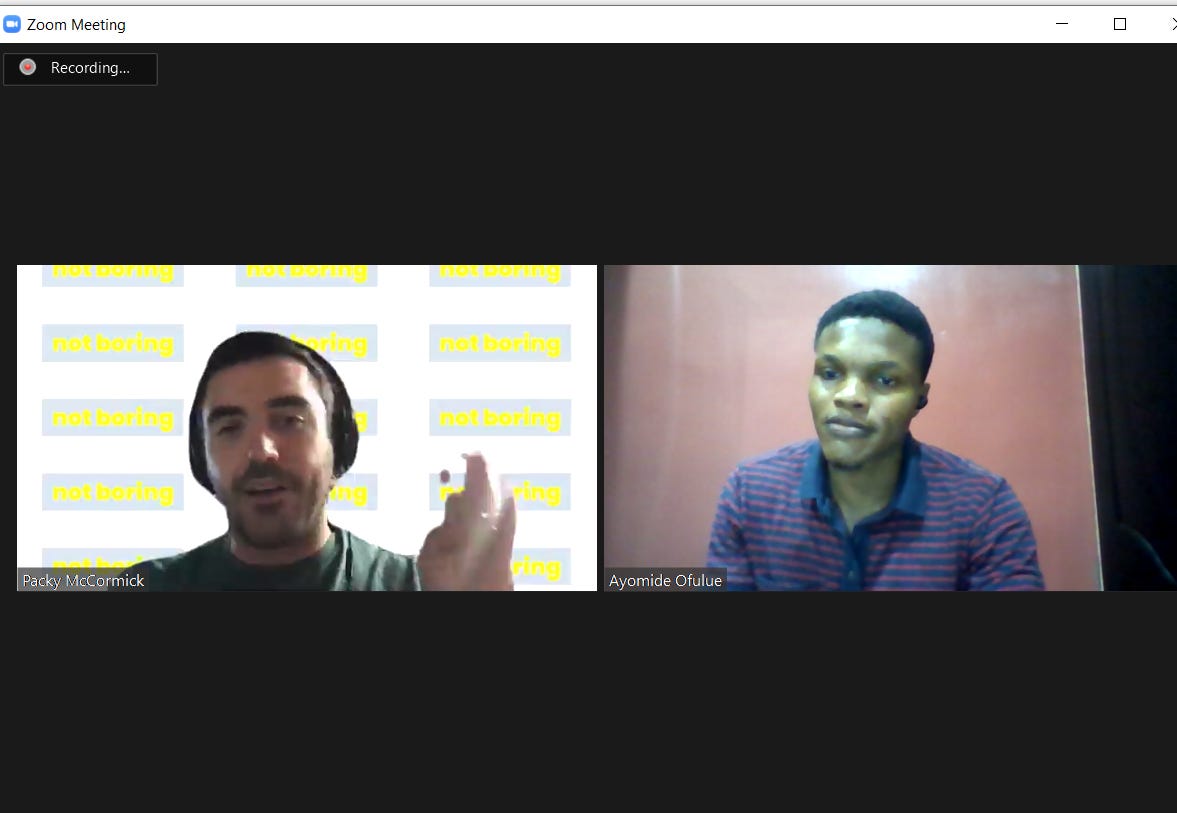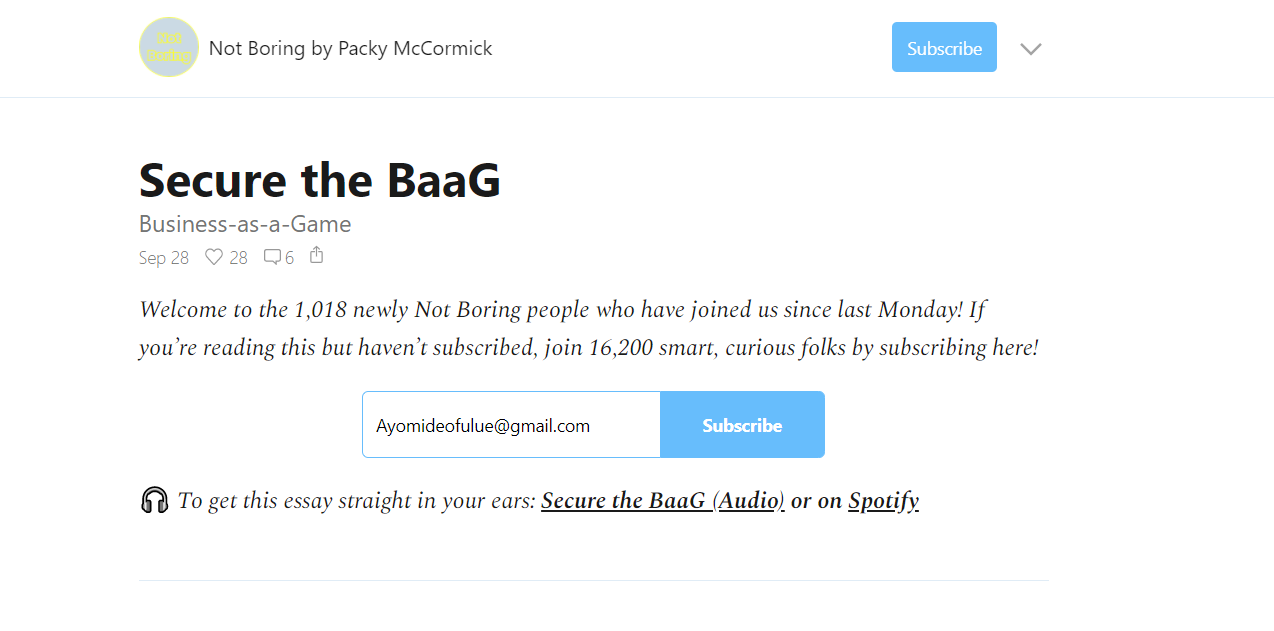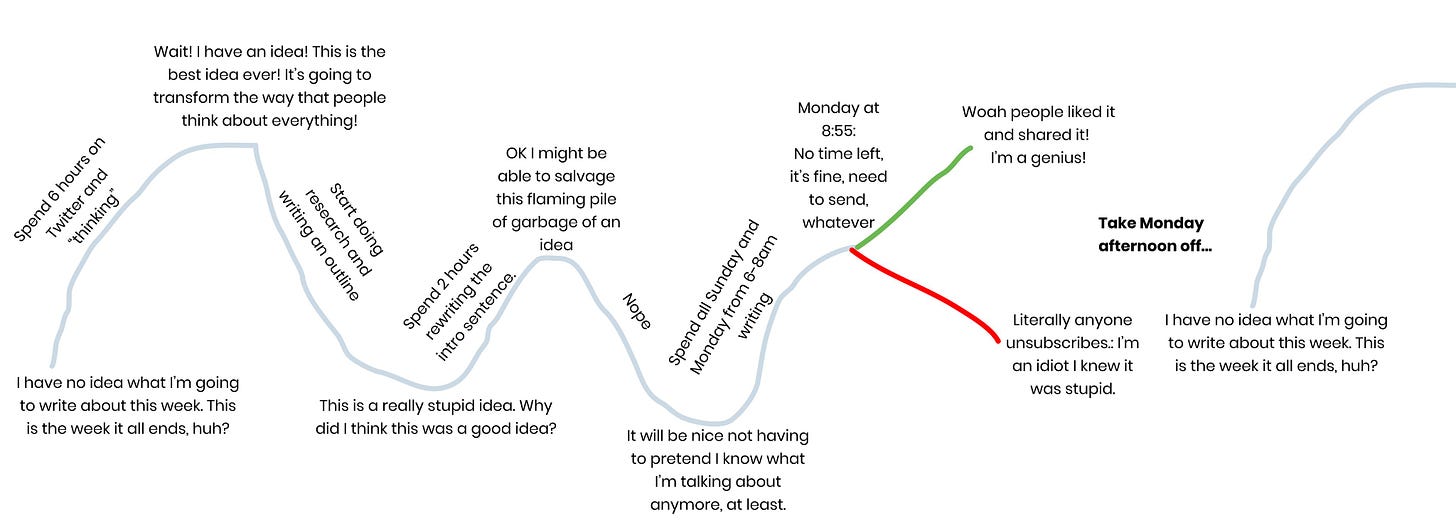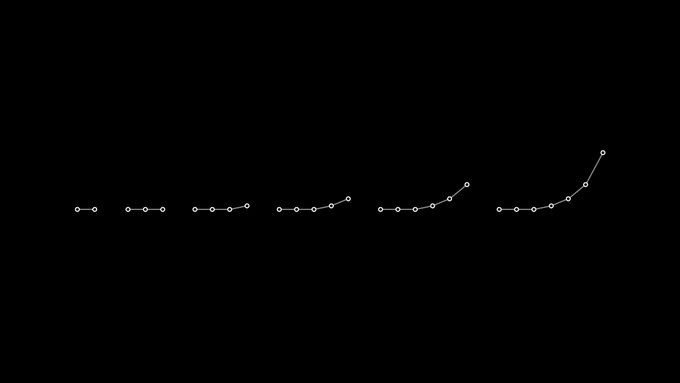Spotlighting Packy McCormick
On Internet Leverage, Building an online audience and differentiation.
Hey guys! I’ve had the best week of my writing journey so far. Joining the compound writing community and landing a feature with today’s spotlight on Packy Mccormick, author of the Not Boring newsletter — one of the fastest-growing newsletters with 16,000 subscribers in just above a year! Here is a link to how this feature happened.
We had an amazing conversation over the weekend and I’ve transcribed the best bits in this newsletter. Get excited, this is going to be a blast of a read!
None of this happens without the support of every single member of this community. If you’re reading this but haven’t subscribed, join 275 amazing writers by subscribing here!

Packy McCormick runs the ‘Not boring’ club and writes the semi-weekly Not Boring newsletter on business strategy and pop culture.
We sat down to discuss his writing system for chunking out 6000-word essays every week, writing as a tool to leverage the internet, finding your voice in a crowded space and much more!
Links:
Twitter: Packym
Website: http://packym.com/
On the Power of the Internet for Leverage
It is incredible how much things can happen for you when you start putting your stuff out there and sharing your ideas online. We're in two totally different parts of the world and our lives are overlapping because we decide to put work online. The biggest lesson from all of this is that it's just worth doing right. It's amazing!
I grew up at the beginning of the internet, AOL, dial-up all of that but didn't really dive in until last year. I just decided to give myself kind of six months in the beginning and I was like, I'm going to start tweeting more and I'm going to write. If it seems like it's going well, I'll keep doing it.
If I just embarrass myself, I'll stop doing it. Luckily, I got enough early momentum, although it was kind of slow. In the beginning, it always is, unless you come with an existing audience.
But over time, it built and built. And now it's become this incredibly powerful thing, right? Getting to meet people, getting to meet you right now through my words. There was a day, a week ago, where I got three DMS in a row from people that I was shocked to get DMS from and it's just because you put yourself out there and these things happen.
And it doesn't happen overnight. And it takes a lot of time. But Wow! Twitter's pretty, pretty unbelievable.

On Transitioning from a 9-5 to Online Writing
So I worked at a company called breather, it was a real estate startup based out of Montreal and New York. I ran our New York market for a little while and then became VP of experience, And I'd been there for almost six years at that point.
But about 18 months ago, I decided to take a writing class (Write of Passage) to keep my brain going and try something new. I started writing online, built up a little bit of an audience, but not much. I was doing an hour before work, and then a little bit on the weekends and squeezing in wherever I could.
And then at the end of the year, I decided that it was time to move on. So I left breather and thought about starting a company. But then the Coronavirus hit and put the company on pause and I decided to dive into writing full time and again, gave myself a few months to hit an X amount of subscribers and stop if it wasn’t going good.
Well, just yesterday, we passed 16,000 subscribers! It took me the first 13 months to get my first thousand and now it's 1000 a week which is crazy. That's incredible. It proves the power of compounding over time and just doing the work and showing up every week.

On Writing as a Tool to Building a Brand Online:
In terms of building a brand online, it has to be around something that you’re passionate about. Because you get known for that one particular thing. And that's what everybody wants to talk about with you.
So you can't just build a brand as you would for a company where you pick the mission, pick the brand, pick what you want the company vision to be known for. With an individual brand, it has to be who you actually are or you're going to get sick of it at some point.
You can't fake it over a long time.
Take David Perell for Instance. He's gone from being fired to a job he didn't like, to building an incredible writing business. The beautiful thing about writing and teaching people how to write is that you’ll have people out there spreading the word because they're writing and they're saying they write, because of you. It's an incredible engine he's built due to writing online
On Finding Your Voice and Building a Personal Monopoly
Everyone at the beginning struggles to find their personal monopoly or a particular niche when starting out. Either you think it's too niche or it's too broad, which is where I started. No one actually thinks that they can find that like particular overlap.
And so for the first year that I wrote, it was all over the place. I was writing about community, real estate and a little bit of as a strategy. I ended up on business strategy after a year but I wanted to avoid doing it because there are so many people out there who do it so well already like Ben Thompson.
Anyway, it took a year for me to narrow down that business strategy is the thing that I actually care about writing. So I did that and added my own voice and spin to it. And really the only difference between pure business strategy writing, which is what I wanted to avoid, and what I'm doing now, is not caring so much.
If I get things wrong, I'm going to research the hell out of it. And then make sure that the details are as correct as possible. Be willing to make predictions and get things wrong and have people say that you got things wrong, and have a little bit more fun with it.
That's where the concept called counter positioning and strategy comes on. It means making a move that the incumbent can't do. Ben Thompson couldn't just start making wild conjectures all over the place. Because his audience trusts him to be very serious.
So the personal monopoly that I found is business strategy, but in a more carefree way and maybe not being 100% right on my predictions.
I would say just have fun, you know, and try a lot of things. Ask yourself ‘ What different spin can I put on what others are already doing?”. Along the way, you’ll find your personal niche because life isn’t linear.

On Word Count and Differentiation in an Era of Content Abundance
There's a lot of advice that gets stale. The feedback I always got was that my articles are way too long. “Nobody on the internet reads long stuff blah blah blah”. So I tried to make it shorter and shorter and shorter.
But I just gave up on that and decided that Long style is how I write. And because a lot of people don't write long in-depth articles, it’s been positively accepted as different. As long as it's not just long because you want it to be unnecessarily long or because you don't know how to edit or anything like that. That's bad.
And it's amazing that up to 50,000 people have read some of these essays on Substack alone and they’re willing to take the time to go in-depth. So it really depends on what you're writing about and there needs to be a match.
I've always been a believer that differentiation, for its own sake is good. Even if you're doing something a little bit worse, but it's different, that's probably better than doing something as well, but the same.
And the downside of the internet is that everything gets replicated so quickly that it gets tired. So you always have to kind of figure out what you need to add to the mix and be different.
On Building a Writing System and The work behind Writing a 6000-word essay every week:
My writing system is unstructured for now and usually creates panic every week for me. But perhaps that panic inspires me to be more creative under the Monday deadline.
So Wednesday afternoon, I start getting an idea of what I'm going to write about. I decide on Thursday, between two different topics, start drafts of two different posts and figure out which one I like more than the other.
And then I'll go super deep down the hall on either ‘Roam’ or ‘Google Doc’ and find as many links as I possibly can, dump them in there, listen to podcasts with the founders of the company, or related to the topic more broadly than I'm writing about.
Take a bunch of notes which helps me read more actively. And then I end up with about a 50-page doc full of notes. For example in the Stripe essay I wrote, I listened to every podcast that the Collison brothers had ever been on and watched some of their keynotes and immersed myself as much as possible in it.
Friday, I typically start writing, and then I'm telling my wife, this is gonna be the week that people realise like that I'm just an idiot. ‘Is everybody gonna hate this thing? Can I actually pull it off? Am I saying anything like new and valuable?’
Then I write, edit, draft down, kind of move things around a little bit, leave spots where I know I need to spend more time but I want to get the structure in place. Send it to brother, who does a lot more hardcore editing.
Then I go and rework it. My wife reads it to tell me essentially like, is this interesting or not? Then I spend the rest of either Saturday or Sunday, depending on when I send it, in the hole, just writing, finding new examples, finding new information. A
Although at some point, you should try to cut off the new information that you're taking in to write the piece.
Normally Sunday night at 10 pm or 11 pm is when I finish and then wake up at six on Monday morning. Go back, read it with fresh eyes, see if it actually reads well or not. Sometimes I've moved whole sections in the morning on Monday.
I guess like the way to boil it down is to figure out what to write about. Find everything that's been like written or said about that topic, immerse yourself, make sure that you're saying something unique that other people haven't said. And then just write, get it edited, write again, and then whenever it's time to send — Just send.

On Breaking the barriers to Publishing and Dealing with Impostor Syndrome:
It comes back to the thing about newsletters and setting a deadline, which is you have to do it, right? 9 am on Monday, my newsletter has to go out and that’s how I know it’s time to hit the publish button.
Every time I hit send, for the first year, and definitely for the first couple of months, I feared that all my friends are gonna make fun of me for this. There’s probably a text chain going on somewhere where they're making fun of me and I think everybody feels that when they're ready to publish.
But the reality is ‘what's the worst that can happen?’ Right? In your head, it's worse than it's gonna actually end up being. ‘What if people don't like this one?’ Okay, cool. They like the last five, so I'll come back next week and retry.
Unless you say something really dumb. The consequences of publishing are not as dire as you think. So it's worth continuing to do it. Push past it!
On Growth Strategy for Newsletters
A referral programme is good, but I think the referral programme works to the extent where you have an audience who wants to share what you're doing. You can't start on day one and say, ‘here's my newsletter, also, here's a referral programme.’
A big strategy that worked was ‘Product Hunt’. Not boring is one of the first Substacks to do a big product launch. And because of that, I was able to direct a lot of the audience and got up to number two for the day that I launched. And that brought in about 2000 people over the course of three days, which at that time, doubled the audience that I had
Otherwise, it's continuing to be a part of the conversation. Every time I write something, I tweeted about it. Half the time, I had a thread to distil it down because they are long pieces.
I've started doing recordings of it and putting it up on all the podcast players to give people as much different access points to the content as possible. (So find ways to make your content more accessible and diversify your channels)
Majorly, it comes back to the content. Nothing feels better than when I get a bunch of signups because somebody smart has recommended it. That’s the best! So most of the work goes into the writing, and then the distribution comes out of that.
On Consistency:
Once I'm stuck on a project, I just don't quit. It's almost just a natural fear of ending the streak. If you feel afraid or tired, use it, versus letting that scare you away from publishing. Make writing bigger than it is in your head a little bit.
I’ve built it up into this thing where it's going to be a huge issue if I don't send the newsletter out on Monday. So own that fear and use it to execute.
Believe that what you're doing matters and then take ownership for it.
Create that accountability. And the further along you go, the bigger the audience gets. So that initial accountability becomes actual accountability because now you have people who are expecting something. Do whatever you can to fake that to yourself in the beginning.

Image from Visualize Value on Twitter.
On the Future of the Newsletter Space and a Crowded Content Economy:
Most people in the world have never heard of Substack, neither do they subscribe to a newsletter at all. So there's plenty of room for more people to come in.
A lot of people will try it as well because it seems like a good way to leverage an audience but a lot of them will kind of drop out down the line. The future belongs to the people who can stick with it and are going to keep going.
I also think everybody should try newsletters at some point to express themselves. But they’ll later figure out that perhaps video makes more sense for them, or, podcasts or Y, or Z.
For a lot of people, what's going to end up happening is that it creates job opportunities in the field that they're interested in. So they'll keep writing on the side, but then they'll go get a new job that's better than any other job that they could have gotten if they hadn't put themselves out there.
There’s also going to be more people monetizing. I thought I was gonna go subscription but I love the sponsorship model so far. I try a bunch of different things. It'll be tough for anybody to just be a newsletter writer full-time and I think you'll have to try a bunch of different things, with the newsletter being the tip of the spear.
In essence, there are opportunities for everyone. Put your work out there. You never know what may happen. Even if there's an abundance of creators, there's always going to be more space for quality on the internet.
Personal Advice to Budding Writers:
Find the thing that you really love and write about it and then it's going to come across to readers. When you do, stick with it until you hit the compounding effect.
Because it is a totally different experience having had a year where my line was flat, and then a few months where it's gone up exponentially. It takes doing it and doing it and doing it. And if you are improving along the way, you'll hit a point where it starts becoming so much fun.
Whoop, hope you thoroughly enjoyed reading that!
This Sunday, we’ll be moving on to part 2 of building a writing system. The plan is that when we wrap the series up, you’ll have the tools you need to write and publish consistently.
In the meantime, I’m thinking of ways for you to connect with other members of this newsletter. How best do you think we can do this? Reply this mail or comment under this newsletter with your answers
Love to hear from you soon,
Keep writing,
Ayomide.
PS: The best way to support this newsletter is by sharing it with another person. Please use the share button to spread the word and grow our budding community.



